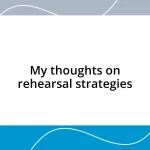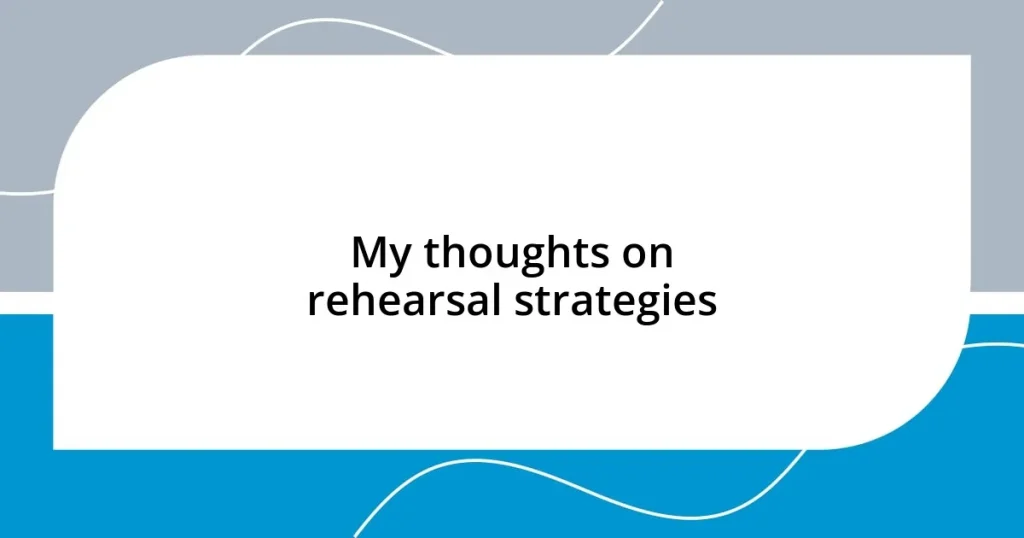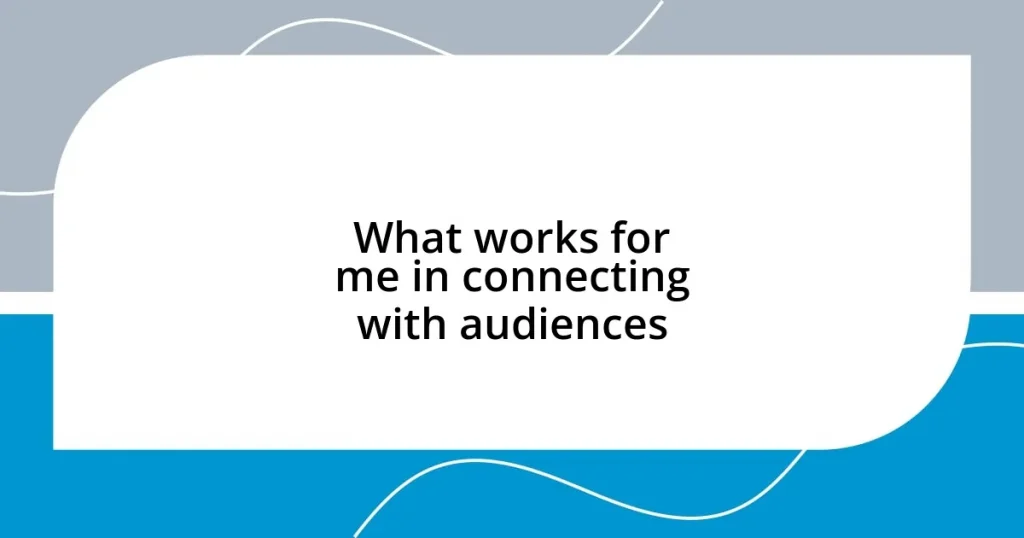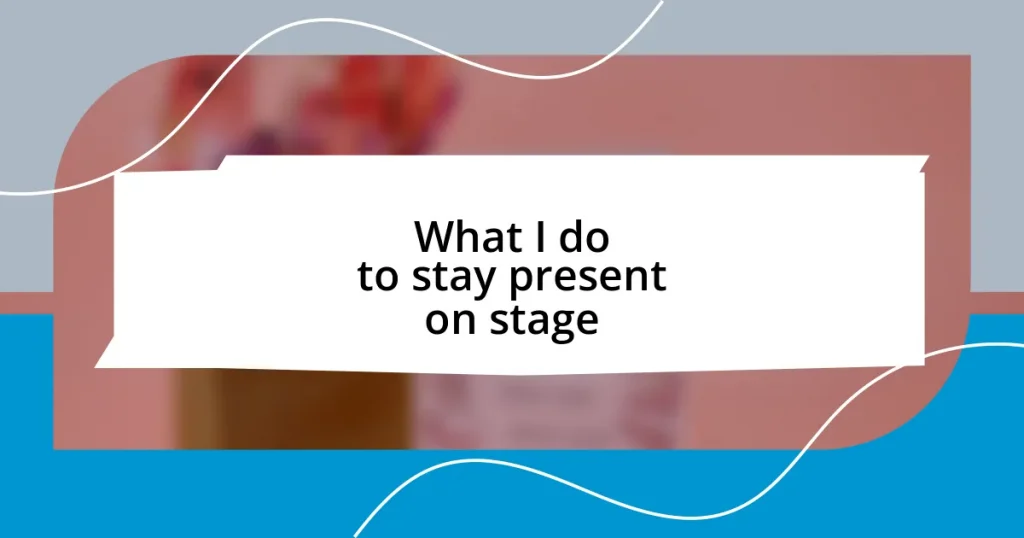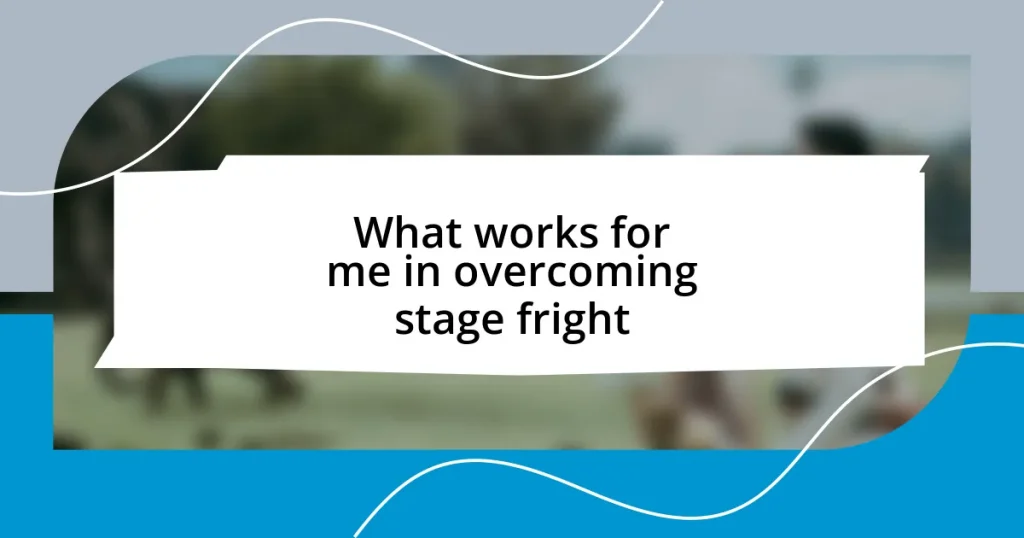Key takeaways:
- Rehearsal strategies enhance not only memorization but also confidence and emotional connection with the material.
- Personalized techniques like chunking, spaced repetition, and visualization significantly improve retention and performance readiness.
- Effective rehearsal fosters collaboration and creativity, turning practice sessions into engaging and insightful experiences.
- Self-reflection and peer feedback are crucial for evaluating rehearsal effectiveness and enhancing future performances.
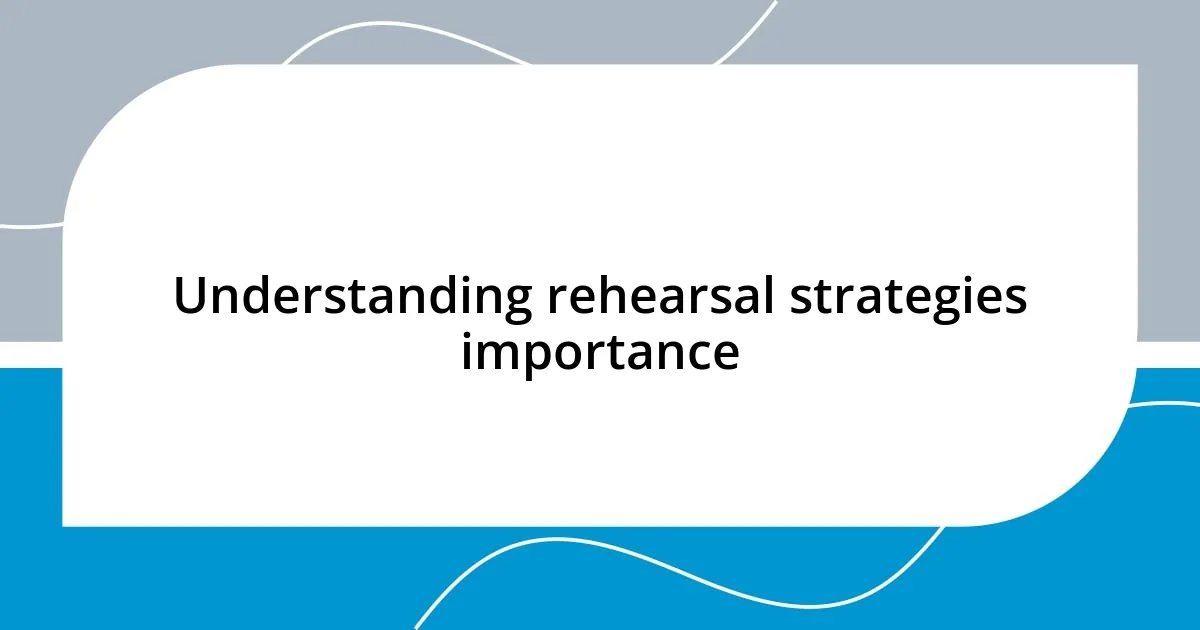
Understanding rehearsal strategies importance
When I think about rehearsal strategies, I can’t help but recall my own experiences in performances. The countless hours spent repeating lines and practicing movements were not just about memorization; they were moments of growth and realization. Isn’t it fascinating how those rehearsals transformed not just my delivery but also my confidence? It’s a crucial part of ensuring success.
The emotional impact of rehearsals often goes unnoticed; we frequently underestimate how preparation shapes our mental state. I remember feeling an overwhelming sense of relief after a solid rehearsal session. It’s as if every word and gesture became second nature. Doesn’t that phenomenon make you wonder how often we can rely on these strategies not just to ace performances, but to calm nerves and build self-assurance?
Moreover, rehearsal strategies aren’t a one-size-fits-all solution; they demand personalization. For example, I’ve found that breaking down complex pieces into smaller sections really helps in grasping challenging material. Have you tried tailoring your approach based on what works best for you? When we discover what resonates with us personally, effectiveness skyrockets.
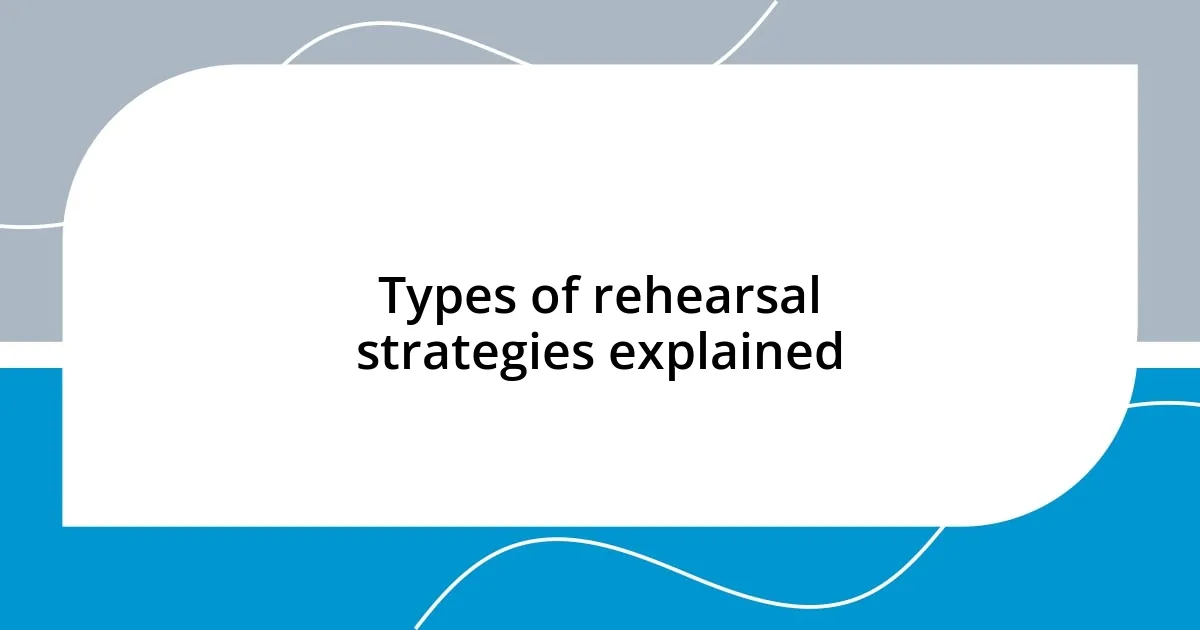
Types of rehearsal strategies explained
There are several rehearsal strategies that I’ve encountered, each with its unique nuances. For instance, one highly effective approach is the use of chunking, where I break down the material into smaller, digestible segments. I remember when I first rehearsed a lengthy monologue this way; it felt much less daunting and allowed me to focus on individual themes rather than becoming overwhelmed by the entire script. It’s like piecing together a puzzle where each section reveals a clearer picture.
Another strategy that’s resonated with me is spaced repetition. Initially, I thought repeating something multiple times in a single sitting was enough. But after attempting spaced intervals over several days, I noticed a significant improvement in my retention and confidence. Sometimes, I would practice a scene one day and revisit it after a couple of days. That lingering time away provided fresh insights and allowed the material to marinate in my mind.
Lastly, there’s the concept of visualization. Upon reading about it, I decided to incorporate this strategy before going on stage. I would close my eyes and imagine the full performance—feeling the lights, hearing the audience, and executing every movement perfectly. The emotions from these mental rehearsals were palpable, and I found that I felt more prepared and at ease when it was showtime.
| Rehearsal Strategy | Description |
|---|---|
| Chunking | Breaking material into smaller parts for easier memorization. |
| Spaced Repetition | Practicing intervals over days for better retention. |
| Visualization | Mental rehearsals to enhance confidence and performance readiness. |
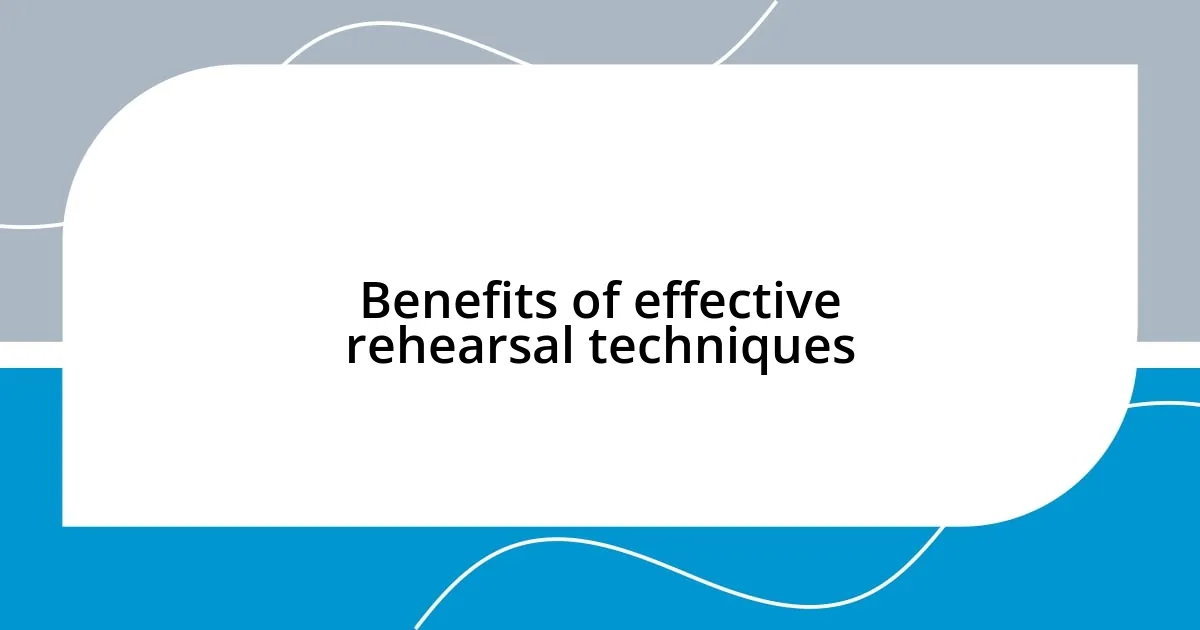
Benefits of effective rehearsal techniques
Effective rehearsal techniques can dramatically elevate performance quality. I’ve experienced firsthand how a focused rehearsal can turn anxiety into exhilaration. The clarity I find in rehearsing not only shapes my delivery but also builds a strong emotional foundation for connecting with the audience. The benefits of these techniques go beyond memory—it’s about feeling grounded in what I present.
Here’s a list of some key benefits I’ve encountered through effective rehearsal strategies:
- Enhanced Confidence: Solid practice sessions replace uncertainty with assurance. When I nail a rehearsal, I step into the spotlight with belief.
- Improved Retention: Techniques like spaced repetition have allowed me to recall lines with greater ease. I’ve been surprised at how much more accessible the material feels after a few days of practice.
- Deeper Emotional Connection: Engaging with the material personally during rehearsals helps me convey genuine emotions on stage. I can think of moments where I connected deeply with a character, and it transformed my performance.
- Ability to Adapt: With thorough rehearsal, I’m more equipped to pivot during live performances. A little extra practice cultivates flexibility, allowing me to tackle unexpected changes with grace.
I also can’t overlook the camaraderie that builds during group rehearsals. Working with others fosters a unique bond that nurtures creativity and support. The rehearsals can feel like a mini-journey where everyone collaborates toward a common goal, deepening our emotional investment in the material. There’s an undeniable magic that happens when we all come together, pushing and challenging one another to excel through our shared experiences.
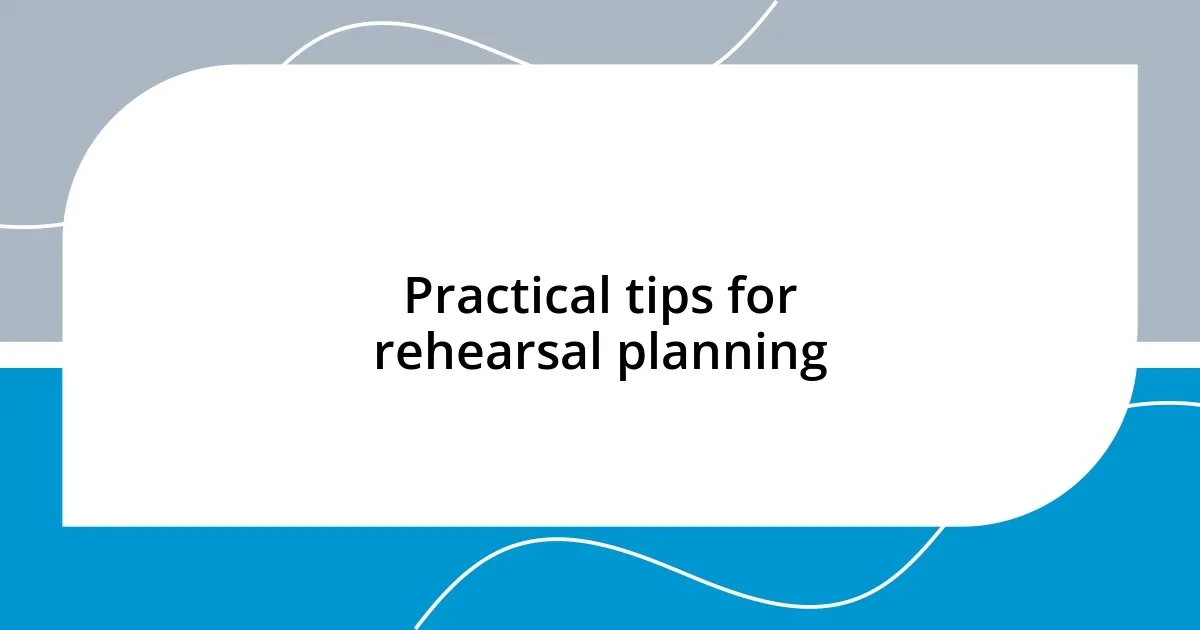
Practical tips for rehearsal planning
When it comes to rehearsal planning, one thing I’ve found invaluable is setting clear goals for each session. For example, I often jot down what I want to achieve before diving in—whether it’s mastering a specific line or working through a challenging scene. This clarity has transformed my rehearsal time from a vague practice into a focused mission, making each session feel productive and fulfilling.
I also recommend incorporating mixed methods into your practice. I vividly remember a particular rehearsal where I alternated between different strategies, like chunking and visualization, to tackle a challenging monologue. The variety not only kept my energy up but also helped me discover new layers within the material, which I hadn’t noticed before. Isn’t it fascinating how switching things up keeps the creative juices flowing?
Don’t forget the power of self-reflection after each rehearsal. I make it a point to ask myself what went well and what I could improve upon. Reflecting on my performance helps solidify my learning and keeps me connected to my emotional journey. Have you ever taken a moment post-rehearsal to really digest what you felt? The insights gained during these reflections often illuminate areas for growth and reinforce my commitment to excellence.
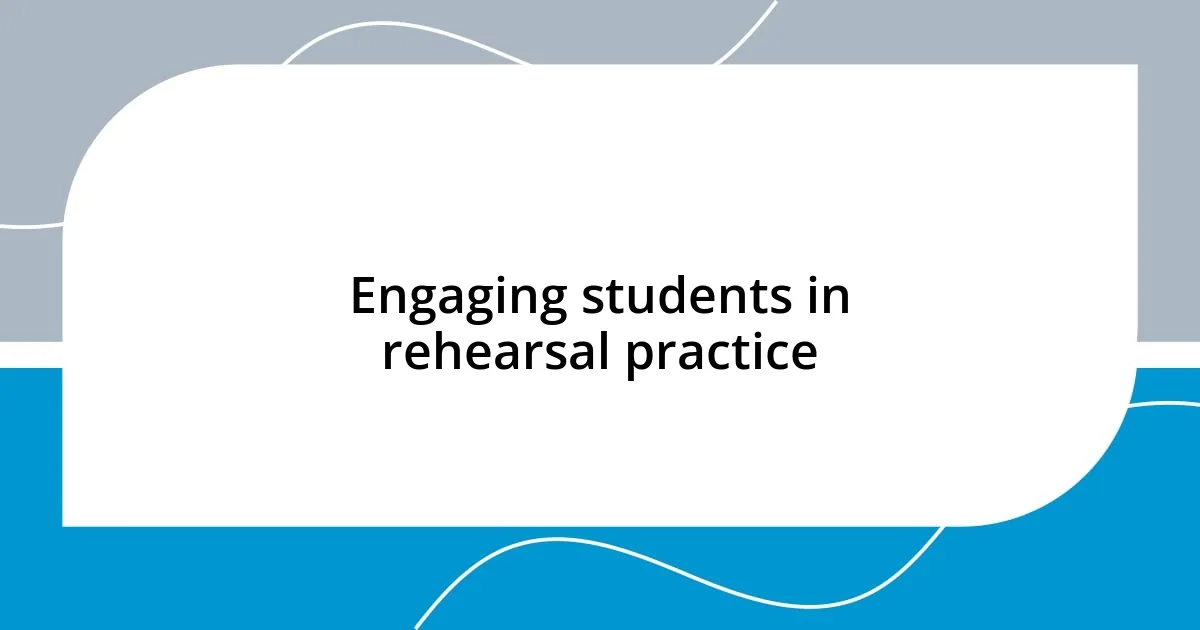
Engaging students in rehearsal practice
I’ve found that engaging students in rehearsal practice can often be about making the experience relevant to their lives. For instance, I remember working with a group of high school students on Shakespeare. At first, they seemed disconnected from the text, but once I encouraged them to relate the characters’ struggles to their own experiences, their enthusiasm surged. Suddenly, rehearsals transformed into a lively discussion, where students would share personal anecdotes that enriched their performances.
Another effective strategy I enjoy using is collaborative rehearsals. Last semester, I paired up students in a scene that required them to tackle complex emotional beats. Watching them bounce ideas off each other was enlightening; they often found insights I hadn’t considered. It made me question: how can creating a safe space for exploration enhance their connection to the material? From my experience, when students feel free to experiment, their performances inevitably soar.
Finally, I’ve discovered the power of gamification in rehearsal practices. One time, we turned a challenging scene into a friendly competition where students could creatively interpret their lines. The laughter and spontaneity that emerged not only alleviated performance anxiety but also fostered a deeper bond among the participants. I can’t help but ask—how often do we underestimate the role of joy in learning? In my view, when students are genuinely engaged, the results are not just better performances but also unforgettable learning moments.
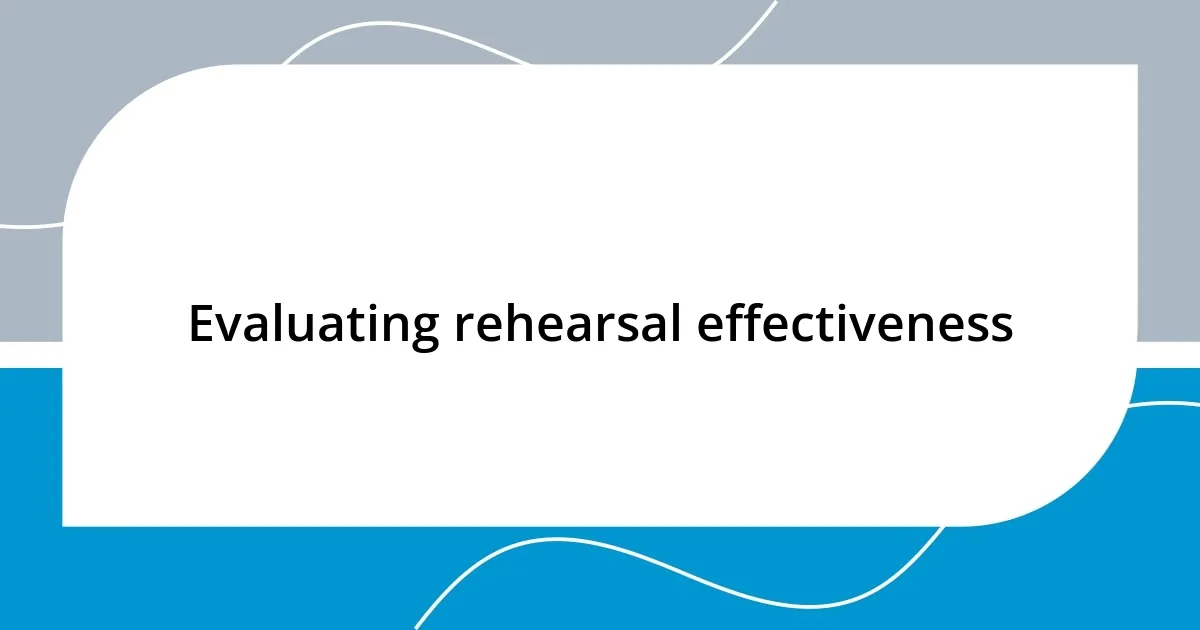
Evaluating rehearsal effectiveness
Evaluating the effectiveness of a rehearsal takes a keen eye and a bit of introspection. I remember one rehearsal where I thought we had nailed a particular scene, but upon reflection, I noticed that the emotional depth was missing. This realization prompted me to question: how often do we mistake proficiency for true connection? From that point on, I made it a point to assess not just what went smoothly, but how authentic the performance felt.
Another method I’ve found helpful is to seek feedback from peers. During one collaborative project, I invited fellow actors to share their thoughts on my portrayal of a character. Initially, I felt vulnerable, but their insights opened my eyes to aspects I hadn’t considered. Asking for input not only helped me grow but also fostered a spirit of support. Isn’t it interesting how we can often see others’ strengths and weaknesses more clearly than our own?
Lastly, I’ve adopted a simple yet effective practice following each rehearsal: I jot down my thoughts immediately afterward. This routine helps capture raw feelings and observations before they fade. I still recall a time when I noted that the blocking felt awkward, which led us to make adjustments that significantly improved our flow. Have you ever kept a rehearsal journal? It’s a small habit that can yield transformative results, giving both clarity and direction for future sessions.








